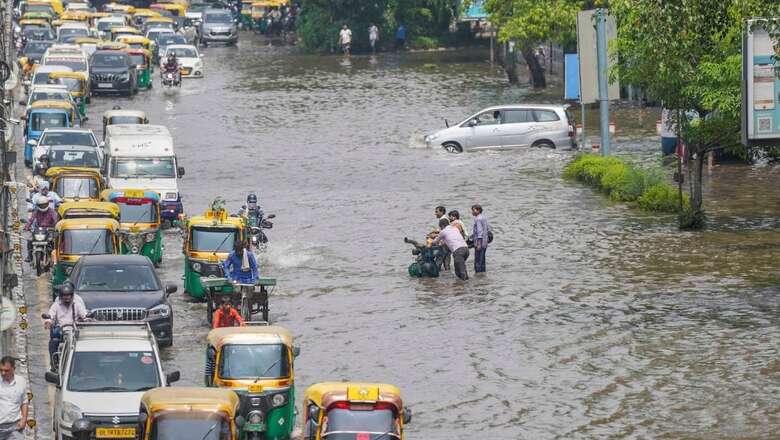
views
At the time when the Indian Space Research Organisation (ISRO) successfully launched Chandrayaan-3, parts of the national capital were submerged. While ISRO’s journey is the stuff inspirational stories are made of, the same cannot be said about governance in India. The Delhi floods are just a recent example of that. It is true that even developed nations suffer from floods, but parts of Delhi were deluged primarily because of the pettiness of the powers that be. Even as the people affected were suffering, the state government and the Central authorities were busy fighting each other and scoring brownie points.
Waterlogging and traffic jams occasioned by rains have become routine in the national capital region (NCR). The recent flooding because of Yamuna’s overflow took place in the areas not far from the Prime Minister’s Office, Parliament, etc. Other big cities — be it Mumbai, Chennai, Kolkata, Bangalore, or Hyderabad — do little better. The increasingly dire events in metropolitan cities in the wake of rains are symptomatic of not just the incompetence and corruption in local bodies but something more fundamental — urban decay. One wonders whatever happened to the smart cities project.
Over four centuries ago, the famous British philosopher Francis Bacon said that knowledge is power. Today, information is power. And we have both, knowledge and information, about the monsoon season. We know fairly well about the timing of the arrival of the monsoon and its movement, the amount of rainfall that it brings, and so on. And yet, the monsoon season wreaks havoc every year. This year was no different, with areas of the national capital near the Yamuna suffering the most.
In other words, monsoon season in India is not a black swan event, something which is absolutely unpredictable, if not unprecedented. It is instead a grey rhino, a totally predictable but neglected threat.
The release of huge amounts of water from the Hathnikund Barrage in Haryana was reportedly one of the factors responsible for the deluge in Delhi. The barrage is on the border between Haryana’s Yamuna Nagar district and Uttar Pradesh’s Saharanpur district. The fact that the barrage is managed by the Haryana government gave the Arvind Kejriwal government an opportunity to find a scapegoat. That Haryana is ruled by the Bharatiya Janata Party (BJP) made scapegoating even easier.
It is not that the BJP has provided many shining examples of administration. The photographs of flooded Delhi roads and homes were all over the media and social media, making a mockery of the tall emerging superpower claims.
While Kejriwal’s Aam Aadmi Party (AAP) and the BJP traded charges, the real issues got obscured in the dust and dirt generated by political debates. An unnamed senior official at the Central Water Commission (CWC), quoted by PTI, made an important point: “We noticed that the water released from the Hathnikund Barrage took less time to reach Delhi compared to previous years. The main reason could be encroachment and siltation. Earlier, the water would have had more space to flow. Now, it passes through a constricted cross-section.”
One need not be a hydrologist to know that encroachment is a big problem. It is the monster that is devouring urban spaces all over the country. It’s a colossal grey rhino: all of us, including politicians, know about it, and yet no one wants to talk about it. The monster has many parents — politicians, officials, cops, and pinkish civil society organisations whose misplaced philanthropy perpetuates the abominations of slums, unauthorised colonies, etc. After all, a lot of encroachers are poor people.
The need of the hour is reforms — in all spheres of life and at various levels. Administrative and police reforms should accompany economic reforms. Unfortunately, our political masters have no time or concern for improvement in administration. When was the last time that you heard political parties fighting elections, or even discussing, the ways and means of improving administration? You can’t remember, because it never happened in the recent past. So, unsurprisingly, few remember the Second Administrative Reforms Commission, headed by Congress leader M. Veerappa Moily, who prepared 15 reports, the last of which came out in April 2009. Newspersons reported about these reports; editorialists wrote edits and articles on the subject; and that was the end of it.
Even today, as Himalayan cities sink and cities get flooded, politicians try to deflect blame towards their rivals rather than do something meaningful to make the lives of people safer. The weapons they use with impunity are whataboutery and ad hominem attacks.
And then there is the last, and often the first, resort of Indian politicians: welfarism. All of them claim to be committed to the welfare state. What they forget is the fact that the welfare state is still a state; administration, law and order, etc., are essential parts of any state. It is time our political class focused on improving the rickety administrative apparatus at all levels instead of introducing more freebies. Only this can make our cities, and villages, safe.
The author is a freelance journalist. Views expressed in the above piece are personal and solely that of the author. They do not necessarily reflect News18’s views.

















Comments
0 comment